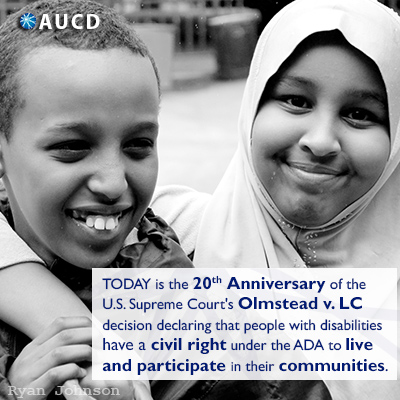AUCD Celebrates the Anniversary of the Olmstead Decision
June 21, 2019

|
Washington, DC, June 21, 2019
Saturday, June 22, 2019 marks the 20th anniversary of the U.S. Supreme Court's landmark Olmstead v. LC decision, which declared that people with disabilities have a civil right under the Americans with Disabilities Act to live and participate in their communities.
"Olmstead sent a clear message that people with disabilities have a right to thrive in their own homes, and that self-determination and community integration are not just aspirational goals, but a fundamental human right," said Andrew Imparato, Executive Director of the Association of University Centers on Disabilities.
The 1999 Olmstead decision fundamentally changed the lives of Lois Curtis and Elaine Wilson, who had both been languishing in an institution for years. Curtis and Wilson filed and won a suit under the Americans with Disabilities Act (ADA) that allowed them to move to a community-based setting. Since then, many people have been freed from institutional or segregated settings and are now living and working in the communities they choose.
Since Olmstead, significant advances have been made to ensure people with disabilities transition from institutions to community-based settings with appropriate supports and services. In addition, many states are closing the front door to institutional care and helping people obtain and keep jobs and find homes within their communities, rather than entering an institution. Increasingly, public policy is promoting and requiring federal funding be used to support individuals' opportunities to live, work and participate fully in their communities.
We applaud these trends while also recognizing that many people with disabilities continue to face barriers to individualized community supports. Many challenges remain, including:
- Nearly every state has significant waiting lists for Medicaid Home and Community Based Services and Supports, the foremost funding source for community living. Recent data (2017) indicates an estimated 472,997 people with I/DD in the U.S. are on waiting lists for community services.
- In most states and communities, it is not unusual for people disabilities to spend their days in sheltered workshops or non-work day services with little opportunity to move out of those environments into supported or competitive employment. Assumptions about the abilities of people with disabilities place low expectations on them, which both underestimate and undermine their potential achievement of supported or paid community employment.
- People with disabilities do not have equal access to various forms of technology (e.g., communication devices, mobility devices, smart home, digital information) that could greatly increase their ability to live and work in the community.
- In the United States more money is spent per person on institutional and segregated services than is spent on community living and supported employment. In fact, $140,831 is spent on institutional services per person (2016 state operated ICF expenditure) compared with $43,928 on community services per person (2016 HCBS expenditure). There continues to be an institutional bias in our Medicaid program toward institutions over community-based services.
AUCD believes that everyone with an intellectual, developmental or other disability deserves to be in the community where they can live the life they choose with dignity. The Federal Government must redouble efforts to enforce the core civil rights protections of Olmstead and to aid state compliance with the Olmstead decision by supporting states in developing capacity to support all people with disabilities in their communities. Congress must support legislation that allows individuals eligible for long-term services and supports under Medicaid the right to individualized services and supports, such as:
- The Disability Integration Act (DIA) (S.117 and HR. 555): Will prohibit discrimination against individuals with disabilities who need long-term services and supports.
- The Transformation to Competitive Employment Act (S.260 and H. 863): Will transform business and program models to support individuals with disabilities to transition to competitive integrated employment, phasing out the use of 14 (c) certificates.
- Access to Free Speech for All Act (AFSFA) (S.1836): Will ensure individuals get the communication devices and services they need.
AUCD joins with other members of the civil rights community in celebrating the progress our society has made in the 20 years since the Olmstead decision, and is committed to continuing the ongoing work needed to fulfill its promise of full inclusion for all members of all communities.
Related Research and Resources:
Community Living and Participation for People with Intellectual and Developmental Disabilities
Tuesday's with Liz: The Olmstead Decision and it's Lasting Effects
---
The Association of University Centers on Disabilities (AUCD), located in Silver Spring, MD, promotes and supports a national network of interdisciplinary centers on disabilities. The members of AUCD represent every U.S. state and territory. AUCD and its members work to advance policy and practice through research, education, leadership, and services for and with individuals with developmental and other disabilities, their families, and communities. For more information, visit AUCD's website, www.aucd.org.







